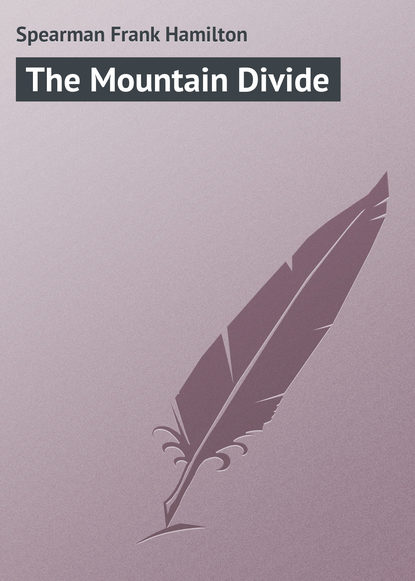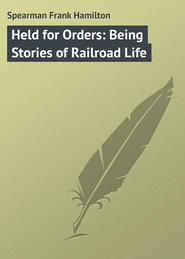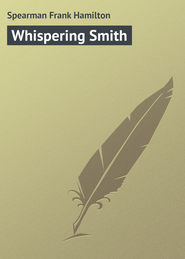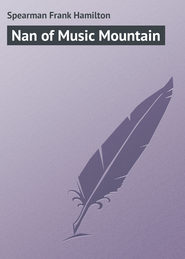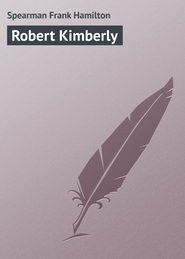По всем вопросам обращайтесь на: info@litportal.ru
(©) 2003-2024.
✖
The Mountain Divide
Автор
Год написания книги
2017
Настройки чтения
Размер шрифта
Высота строк
Поля
It was with queer sensations that Bucks found himself in a hostile country and with the deadliest enemies of the white man going into camp for the night. Within a minute or two after Scott and the wounded brave had picked a defended camp near a rivulet of water, the two squaws had a fire going, and they set to work at once dressing an antelope.
Savory morsels were cut from choice spots on the carcasses and these were broiled by impaling them on long sticks over the fire. Bucks, learning very fast with his eyes, saw how surprisingly small an affair an Indian camp-fire is, and how much could be done with a few buffalo chips, if one understood how to keep them renewed. Both safety and convenience were served by the tiny blaze, and meat never tasted as good to Bucks as it did on that clear, frosty night, broiled by the two women and garnished from Bob Scott’s provident salt bag.
After satisfying his ravenous hunger, which the Indians considered not even a fair appetite, Bucks asked to look at the warrior’s injured arm, explaining that his father had been an army surgeon in the great white man’s war, as Bob Scott designated the Civil War in translating for the Sioux. The arm, which was badly swollen, he found had indeed been broken by a bullet near the wrist, but only one bone was fractured, and, finding no trace of the bullet, the confident young surgeon offered to set the fracture.
Iron Hand, nothing loath, accepted the offer, and after cleansing the wound as well as it could be cleansed in running water hard by, Bucks took the rough splints handily supplied by Scott’s hunting-knife, and pulling the bone into place with the scout’s aid–though the brave winced a little at the crude surgery–he soon had the forearm set and was rewarded with a single guttural, “Wa-sha-ta-la!” from the stalwart warrior, which, Bob explained, meant, “Heap good.”
Sitting afterward by the camp-fire, Scott and Iron Hand, since the young chief would not talk English, conversed in the Sioux tongue, the scout translating freely for his younger companion, while the squaws dressed the second antelope and cut it up for convenience in carrying on the horses to Casement’s camp. Scott reserved only the hind-quarters of each animal for himself and Bucks, giving the rest to their hosts.
When it was late, Scott showed the boy how to pillow his head on his saddle and then stretched himself out to sleep. Bucks lay a long time looking up at the stars. When he fell asleep, he woke again very soon. His companion was sleeping peacefully beside him, and he saw Iron Hand sitting by the fire. Bucks easily imagined his arm would keep him awake. The squaws were still broiling pieces of antelope over the little blaze, which was neither bigger nor smaller than before, and together with the chief they were still eating. Bucks slumbered and woke again and again during the night, but always to see the same thing–the three Indians sitting about the fire, broiling and eating the welcome and wholly unexpected venison.
CHAPTER IV
Before daybreak the scout roused his companion, and, after breakfast with the three Sioux, who, according to Bob, were still eating supper, the two hunters left their chance companions in the canyon, rode rapidly south, and, with their antelope haunches as trophies, reached Casement’s camp about ten o’clock.
Stanley, who was conferring with Casement, came out of the tent greatly amazed at his scout’s venturing so far on a hunt as to expose himself and his companion to danger.
“We were safe every minute, colonel,” declared Scott.
“Safe?” echoed Stanley incredulously. “No man is safe, Bob, a mile from the track-layers. The Sioux killed and scalped one of our engineers not ten miles from here, when we were running this very line last winter.”
“This lad,” nodded Scott, “is as good a shot as I am. He brought down the first antelope. We get along with the Sioux all right, too, don’t we, Bucks?” he demanded, appealing to his fellow-hunter. “We ate supper with them last night,” he added to mystify his listeners, “and camped with Iron Hand.”
Even General Casement stared at this and waited to hear Scott tell Stanley the story of their night’s adventure. “However, colonel,” concluded Scott, “there is a war party of Cheyennes near here. It is a good time to be careful.”
“All right, Bob,” retorted Stanley, looking at his scout keenly, though no one could be angry at Scott long. “You set the example.”
The words were hardly out of his mouth when an operator came running down the track from the telegraph tent with a message for General Casement. It contained word from the operator at Peace River that section men reported a war party of Indians, crossing the railroad near Feather Creek, had attacked an emigrant party camped there.
In an instant the whole construction camp had the news and the work was thrown into confusion. Feather Creek was twenty miles away. Orders flew fast. A special train was made up, and Stanley taking command, with Casement to aid, made ready instantly to leave for the scene of the disaster.
The men running from the grade fell into line like veteran soldiers. Indeed, most of them had seen service in the war just closed and the smell of powder was no novelty. Bob Scott turned the venison over to Oliver and loaded his horse in the car with those of the cavalrymen. Under Stanley’s orders he himself rode as pilot in the cab with the engine crew. Bucks also reported to Stanley, and within twenty minutes the relief train carrying two hundred men was plunging down the long hill toward Feather Creek. Heads were craned out of the car windows, and in rounding every curve Bucks, with the scout Leon Sublette, sitting greatly wrought up behind Stanley and Casement, expected momentarily to see Cheyenne war bonnets spring up out of the stunted cedars that lined the hills along the right of way.
But not a sign could be seen of any living thing. The train reached Feather Creek, and slowly crossed the bridge before Scott signalled the engineman to stop. His eye had detected the scene of the fight, and the ground beyond–a low cut–was favorable for getting the men safely out of the cars.
As the engine slowed, a little scene of desolation beside the right of way met Bucks’s eye, and he caught sight of the ghastly battle-field. A frightened section crew emerged from the wild-plum thickets along the creek bottom, as the cavalrymen, followed by Casement’s armed men, poured out of the three cars. Stanley with his scouts led the way to the emigrant camp, where the fight had taken place. The wagons had been burned, the horses run off, and the three unfortunate men butchered.
Bucks experienced a shock when Scott came upon the three dead men whose mutilated bodies had been dragged from the scene by the section men and who lay with covered faces side by side under a little plum-tree, fragrant with blossoms and alive with the hum of bees. The sunshine and the beauty of the spot contrasted strangely with the revolting spectacle upon the grass.
Stanley gave the orders by which the bodies were conveyed to the train and with the scouts and cavalrymen reconnoitering the surrounding country, Casement’s men lay on their arms in the shade of the cut. Dancing rigged a pony instrument to the telegraph wires, which had not been disturbed, and Bucks transmitted messages to Fort Kearney advising the commanding officer of the murders and adding afterward the report of Scott and Sublette as to the direction the marauders had taken in flight.
“Who were the beasts, Bob, that could treat men like that?” demanded Bucks in an angry undertone, when he had clicked the messages over the wires.
“Bad Indians,” answered Scott sententiously. “You have that kind of white men, don’t you? These fellows are probably Turkey Leg’s thieving Cheyennes. We shall hear more of them.”
In the meantime the scouts and the cavalry detail rode out again trying to unmask the Cheyennes, but without success. It was a week before they were even heard of, and after an all-day attempt to do something, the train backed up to camp and work was resumed as if nothing had happened.
After waiting a few days, Stanley, always restive under idleness, determined to push on across the Sweet Grass country with horses, to learn how the timber cutters on the river were faring with their slender military guard. The party, consisting of the detail of ten men and the two scouts and Bucks, started one morning at sunrise and made their way without molestation into the little-known mountain range called then, as far south as Colorado, the Black Hills.
Stanley explained to Bucks during the morning how the chief engineering difficulty of the whole transcontinental line confronted the engineers right where they were now riding. Here the mountains were thrown abruptly above the plain to a great height and the locating engineers were still at their wits’ ends to know how to climb the tremendous ascent with practicable grades. Stanley became so interested in studying the country during the day, as the difficulties of the problem presented themselves afresh to him, that the party made slow progress. Camp was pitched early in the afternoon under a ridge that offered some natural features for defence. Here the cavalrymen were left, and Stanley, taking Scott, started out after some venison for supper. Bucks stood by, looking eager as the two made ready for the hunt.
“Come along if you like,” said Stanley at length. “You won’t be happy, Bucks, till you get lost somewhere in this country.”
Sublette lent Bucks a rifle, and the three men set out together, riding rapidly into the rough hills to the northwest. Scott covered the ground fast, but he searched in vain for sign of antelope. “Indians have been all over this divide,” he announced after much hard riding and a failure to find any game. “It doesn’t look like venison for supper to-night, colonel. Stop!” he added suddenly.
His companions, surprised by the tone of the last word, halted. Leaning over his pony’s neck the scout was reading the rocky soil. He dismounted, and walking on, leading his horse, he inspected, very carefully, the ground toward a dry creek bed opening to the east.
He was gone perhaps five minutes. “Colonel,” he said, smiling reassuringly, when he returned, “this is no place for us.”
“Indians,” said Stanley tersely.
“Cheyennes. Back to camp.”
“Down the creek?” suggested Stanley.
“The bottom is alive with Indians.”
“Up then, Bob?”
“Their camp is just above the bend. They have spotted our trail, too, somehow. It may be they are riding easy to close in on us,” smiled Scott, while Bucks’s hair began to pull. “Our way out is over this divide.” He indicated the rough country east of the creek as he spoke.
“Divide!” exclaimed Stanley, looking up at the practically sheer walls of rock that hedged the course of the creek. “We can’t climb those hills, if we never get out.”
“They’re not quite so bad as they look. Anyway, colonel, we’ve got to.”
“They can pick us off our horses like monkeys all the way up!”
“It’s a chance for our scalps, colonel. And it will be as hard riding for them as it is for us.”
Stanley looked at Bucks with perplexity. “This boy!”
“I can make it, Colonel Stanley,” exclaimed Bucks, who felt he must say something.
Stanley still hesitated.
“We’ve no time to lose,” smiled Scott significantly.
“Then go ahead, Bob.”
They had half a mile of comparatively level ground to cross before they began their climb, and this strip they rode very hard. When they reached the hills, Scott headed for a forbidding-looking canyon and urged his horse without ceasing through the rocky wash that strewed its floor. Stanley, with an excellent mount, could have kept well up, but he had put Bucks ahead of him in the safe place of the little procession, and the boy had difficulty in keeping within call of their active leader. The minute they were out of sight of the creek bottoms, Scott, choosing an apparently unscalable ascent, urged his horse up one of the canyon walls and the three were soon climbing in order.
Happily, Bucks’s scrub horse gave a better account of himself in climbing than he had done in covering better ground. As their horses stumbled hurriedly along the narrow ledges, they made noise enough to wake the Indian dead and the loose rock tumbled with sinister echoes down the canyon wall. But progress was made, and the white men felt only anxious lest pursuit should catch them exposed on the uncovered height up which they were fast clambering.
Secure in their escape, the three were nearing the coveted top when a yell echoed through the canyon from below. There was no mistaking such a yell. Bucks, who had never heard anything so ferocious, had no need to be told what it was–it, so to say, introduced itself. And it was answered by another yell, more formidable still, and again by a chorus of yells. Then it seemed to Bucks’s unaccustomed ears as if a thousand lusty throats were opened, and scared rigid he looked behind him and saw the canyon below alive with warriors.
They were riding helter-skelter to reach a range where they could pick the fugitives off the crest of the canyon side. Within a minute, almost, their rifles were cracking. Scott had already reached a point of concealment, and above the heads of Bucks and Stanley fired his rifle in answer. An Indian brave, riding furiously to a rock that would have commanded Stanley and Bucks as they urged their horses on, started in his saddle as Scott fired and clutched his side instantly with his rifle hand. His pony bolted as the half-hitch of the rawhide thong on its lower jaw was loosened and the rider, toppling, fell heavily backward to the ground. The riderless horse dashed on. The yelling Indians had had their blunt warning and now scurried for cover. The interval, short as it was, gave Bucks and Stanley a chance.
Spurring relentlessly and crouching low on their horses’ necks, they made a dash across the exposed wall of rock near the top, that lay between them and safety. A renewed yell echoed the rage and chagrin of their pursuers, and a quick fire of scattering shots followed their rapid flight, but the Indians were confused, and Bucks, followed by his soldier champion, flung himself from his saddle in the clump of cedars behind which Scott, safely hidden, was reloading his rifle. Choosing his opportunity carefully, Stanley fired at once at an exposed brave and succeeded in disabling him. Bucks was forbidden to shoot and told to hold his rifle, if it were needed, in readiness for his companions. With the bullets cutting the twigs above their heads, Stanley and Scott held a council of war. Scott insisted on remaining behind to check their pursuers where they were, while the two with him rode on to safety.





